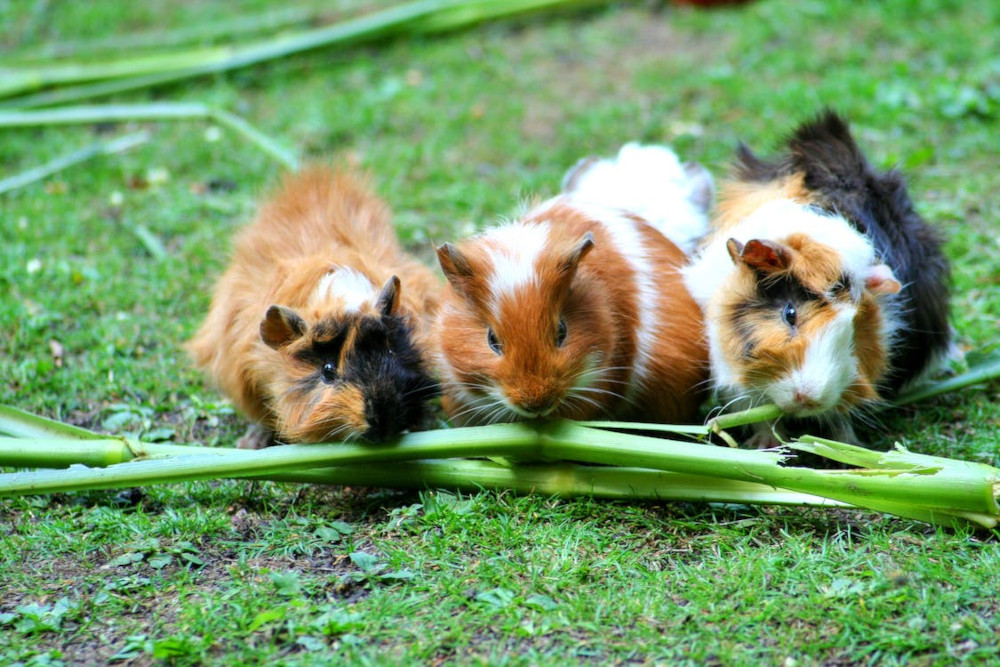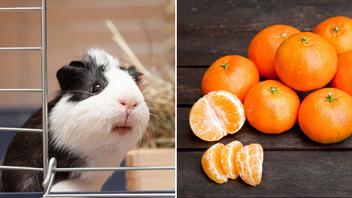Guinea pigs, those adorable, furry creatures, often become beloved members of the family. Providing them with a healthy and happy life includes offering a well-balanced diet that nourishes their bodies and supports their well-being. But when it comes to the delicious fruit, the orange, does it belong on their menu? This question often arises, leading to a healthy debate among guinea pig owners. This comprehensive guide will delve into the complex relationship between guinea pigs and oranges, exploring the potential benefits, risks, and best practices for offering this citrus fruit to your furry friend.
>> READ MORE:
- Can Guinea Pigs Eat Broccoli? A Comprehensive Guide to This Popular Veggie
- Guinea Pig Vision A Comprehensive Overview
- Can a Bath Kill a Guinea Pig Understanding the Risks
- From Litter Box to Freedom A Guide to Potty Training Your Guinea Pig
Contents
Nutritional Value of Oranges for Guinea Pigs

Oranges, bursting with vibrant color and refreshing scent, are a staple in many human diets. They are packed with vitamin C, a crucial nutrient for humans. Naturally, we might be tempted to share these juicy delights with our beloved guinea pigs. However, the truth is not as simple as assuming that what’s good for us is good for them. In fact, there are several factors to consider when determining if oranges should be included in a guinea pig’s diet.
Vitamin C in Oranges: Is It Beneficial for Guinea Pigs?
One of the main reasons why oranges are so appealing as a snack for guinea pigs is because of their high vitamin C content. Just like humans, guinea pigs cannot produce their own vitamin C and therefore rely on dietary sources to meet their daily requirements. According to the Guinea Pig Manual, an adult guinea pig needs between 25-50mg of vitamin C per day. This can increase up to 100mg per day during pregnancy or lactation.
Oranges are known to contain high levels of vitamin C, with one medium-sized orange providing approximately 70mg. This may seem like a perfect match for the nutritional needs of guinea pigs. However, there are a few things to consider.
Firstly, the vitamin C in oranges starts to degrade as soon as it is picked from the tree. This means that by the time it reaches your grocery store, it may have lost a significant amount of its nutritional value. Furthermore, since most guinea pigs tend to be picky eaters, they may not consume the entire orange and instead leave chunks behind, further reducing their vitamin C intake.
Secondly, guinea pigs have a specific gastrointestinal system that differs from humans. They have a unique digestive process that requires them to get their vitamin C from the bacteria present in their gut, rather than directly from their food. This makes them less dependent on foods high in vitamin C and more reliant on a constant supply of dietary fiber.
Finally, while oranges do contain vitamin C, they are also high in sugar and acidity, which can negatively affect the health of guinea pigs (more on this later). Therefore, it is important to carefully consider the overall nutritional value of oranges before including them in a guinea pig’s diet.
Other Nutrients in Oranges: Are They Beneficial for Guinea Pigs?
Aside from vitamin C, oranges also contain other essential nutrients such as potassium, folate, and thiamine. These nutrients are crucial for human health, but do they provide any benefits for guinea pigs?
Potassium is an electrolyte that plays a vital role in regulating fluid balance and muscle contractions. However, guinea pigs require a very small amount of potassium in their diet, and they usually obtain it from other sources such as hay and vegetables. An excessive amount of potassium in a guinea pig’s diet can lead to kidney damage, so it is essential to monitor their intake carefully.
Folate, also known as folic acid, is essential for cell growth and development. While guinea pigs do require folate in their diet, they can obtain it from other sources such as leafy greens like romaine lettuce and spinach.
Thiamine, also known as vitamin B1, is essential for converting food into energy and supporting the nervous system. Although guinea pigs do require thiamine in their diet, they can easily obtain it from other sources such as hay and pellets.
In summary, while oranges do contain some beneficial nutrients, they are not essential for a guinea pig’s diet. Instead, it is crucial to focus on providing them with a variety of high-quality hay, vegetables, and pellets to meet their nutritional needs.
Risks of Feeding Oranges to Guinea Pigs

While there may be some potential benefits to feeding oranges to guinea pigs, there are also several risks that need to be considered.
Sugar Content of Oranges: Too Much of a Good Thing?
One of the main concerns with feeding oranges to guinea pigs is their high sugar content. A medium-sized orange contains approximately 12 grams of sugar, which is almost three times the recommended daily intake for guinea pigs. As herbivores, guinea pigs are designed to consume a diet high in fiber and low in sugar. Therefore, consuming too much sugar can lead to various health problems, including obesity, dental issues, and digestive upsets.
Furthermore, guinea pigs have delicate digestive systems that are not equipped to handle large amounts of sugar. The sudden spike in blood sugar levels caused by consuming oranges can lead to bloating, gas, and diarrhea, which can be harmful to their health.
Acidic Nature of Oranges: Upsetting the Balance
Aside from sugar, oranges are also highly acidic, which can cause problems for guinea pigs. The ideal pH level for a guinea pig’s digestive tract is between 6.5-7.5. Anything below this range can disrupt the balance of good bacteria in their gut, leading to digestive issues. Oranges have a pH level of around 3.5-4.5, which is quite acidic and can cause discomfort for guinea pigs.
Moreover, the high acidity in oranges can also damage a guinea pig’s delicate teeth and mouth. Guinea pigs have continuously growing teeth, and any damage to them can lead to issues with eating and overall health.
Allergies and Sensitivities: Not All Fruits Are Created Equal
Just like humans, guinea pigs can have allergies and sensitivities to certain foods. While oranges may not be toxic to guinea pigs, they can still cause allergic reactions or sensitivities, leading to symptoms such as itching, sneezing, and respiratory problems. If you notice any adverse reactions in your guinea pig after consuming oranges, it is best to avoid giving them this fruit and consult with a veterinarian.
How to Safely Offer Oranges to Guinea Pigs

Despite the risks involved, some guinea pig owners may still wish to offer oranges to their furry friends. If you do decide to include this fruit in your guinea pig’s diet, it is crucial to do so safely and in moderation.
Moderation Is Key: Practice Portion Control
Due to the high sugar content and acidic nature of oranges, it is recommended to limit the amount of this fruit in a guinea pig’s diet. One medium-sized orange contains more sugar than a guinea pig should consume in a single day. Therefore, it is essential to practice portion control and only offer small amounts of oranges as a treat occasionally.
A good rule of thumb is to offer no more than one to two small slices of orange per week. This will help prevent any potential health issues associated with overconsumption.
Choose Organic and Wash Thoroughly: Pesticides and Chemicals
When offering any type of fruit or vegetable to guinea pigs, it is crucial to choose organic options and wash them thoroughly before feeding. Oranges are often sprayed with pesticides and chemicals that can be harmful to guinea pigs. Therefore, it is essential to remove any potential contaminants by washing the fruit with water and a mild, organic vegetable cleaner.
Remove Seeds and Peel: Potential Choking Hazards
Before offering oranges to your guinea pig, it is crucial to remove all seeds and the peel. The seeds of oranges can be a choking hazard, and the peel is difficult for guinea pigs to digest. Peel can also contain bacteria and pesticides, which can be harmful to your pet’s health. It is best to only offer the flesh of the orange in small, seedless pieces.
Observe Your Guinea Pig: Monitor for Any Adverse Reactions
As mentioned earlier, not all guinea pigs react the same way to certain foods. It is essential to observe your pet closely after introducing oranges into their diet. If you notice any adverse reactions such as diarrhea, bloating, or changes in behavior, it is best to discontinue offering this fruit and consult with a veterinarian.
Alternatives to Oranges for Guinea Pigs

While oranges may be tempting to offer to guinea pigs, there are many other safe and nutritious alternatives that can provide similar benefits without the risks.
Bell Peppers and Strawberries: High Vitamin C Content
If you are looking to boost your guinea pig’s vitamin C intake, there are plenty of safe and healthy options to choose from. Bell peppers and strawberries are both low in sugar, high in fiber and vitamin C, making them excellent alternatives to oranges. Bell peppers have the added benefit of being a great source of hydration for guinea pigs due to their high water content.
Leafy Greens: Essential Nutrients and Hydration
Leafy greens such as romaine lettuce, spinach, kale, and parsley are crucial for a guinea pig’s diet. They provide essential nutrients, including vitamin C, and are also high in water content. Guinea pigs love these greens, and they make a safe and delicious addition to their meals.
Hay: The Staple of a Guinea Pig’s Diet
Finally, one of the most essential components of a guinea pig’s diet is hay. It should make up the majority of their food intake and should be available at all times. Hay is high in fiber and low in sugar, making it essential for a healthy digestive system. It also provides a source of entertainment for guinea pigs, as they can chew on it and keep their teeth trimmed.
Conclusion: A Balanced Diet for Guinea Pig Health
In summary, while oranges may seem like a healthy and appealing snack for guinea pigs, there are several factors to consider before feeding them to your furry friend. While they do contain vitamin C, they are also high in sugar and acidity, which can lead to various health issues for guinea pigs. If you do decide to offer oranges to your pet, it is crucial to do so safely and in moderation. However, there are plenty of other safe and nutritious alternatives to choose from that can provide similar benefits without the risks. By understanding your guinea pig’s dietary needs and carefully selecting the right foods, you can ensure that your pet receives a balanced and healthy diet to support their overall well-being.
